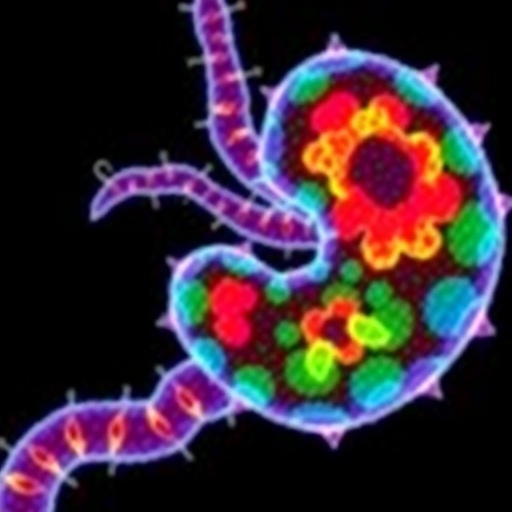Indiana University School of Medicine researchers have made a significant breakthrough in the battle against pancreatic cancer, a disease notorious for its lethality and resistance to treatment. Their innovative approach targets two critical proteins that fortify the cancer cells’ defenses against therapy, providing new hope for more effective interventions. By combining drugs that inhibit both redox effector factor-1 (Ref-1) and peroxiredoxin-1 (PRDX1), scientists may have uncovered a synergistic method to dismantle the robust protective mechanisms of pancreatic tumors.
Pancreatic cancer remains among the deadliest malignancies, with a dismal five-year survival rate hovering around 13%. One reason for this poor prognosis is the cancer’s ability to survive in hostile environments and evade the cytotoxic effects of traditional chemotherapy and radiation. To combat this resilience, Indiana University researchers examined the molecular underpinnings that enable tumor cells to flourish despite aggressive treatments. They zeroed in on Ref-1, a multifunctional protein involved in DNA repair, redox signaling, and cellular response to oxidative stress, hypothesizing that its inhibition could sensitize tumors to therapy.
Intriguingly, the study revealed that another protein, peroxiredoxin-1, operates in tandem with Ref-1 to bolster pancreatic cancer cells’ survival. PRDX1 is an antioxidant enzyme that reduces peroxides, thus protecting cells from oxidative damage. This partnership appears to be a key driver of the cancer’s robust defense system. When researchers selectively knocked down PRDX1 alongside pharmacologically inhibiting Ref-1 with a novel agent called APX2014, the dual attack provoked substantial tumor shrinkage and increased cancer cell death in preclinical models.
The specificity of PRDX1’s role was a surprising finding. Of all the related peroxiredoxins tested, only loss of this protein sensitized tumors significantly to Ref-1 blockade. This suggests a unique and exploitable vulnerability within the pancreatic tumor microenvironment. Mark Kelley, PhD, the lead author of the study and a distinguished pediatric oncology researcher at Indiana University, noted that the combined inhibition of both Ref-1 and PRDX1 outperformed treatments targeting either protein alone. Animal experiments supported this conclusion, showing smaller tumors and enhanced survival outcomes.
The ramifications extend beyond pancreatic cancer. The dual protein inhibition strategy also impacts the tumor microenvironment — the surrounding tissue, immune cells, and extracellular matrix that collectively support tumor growth and spread. By disrupting these interactions, the therapy undermines the cancer’s capacity to adapt and resist treatment, potentially translating into improved clinical responses. This broad efficacy suggests applicability to other aggressive cancers with similar survival pathways.
The innovative drug APX2014, developed by the team, is a potent inhibitor of Ref-1’s redox functions. Ref-1 regulates transcription factors such as NF-κB and HIF-1α, which are essential to cancer cell proliferation and survival under oxidative stress. By blocking Ref-1, APX2014 impairs the tumor’s ability to respond to DNA damage and oxidative insults. Coupling this with PRDX1 suppression amplifies oxidative stress within the cancer cells, pushing them toward apoptosis.
Future work will build on these promising results by identifying additional agents capable of targeting PRDX1 effectively. Researchers are also planning to test the combined therapeutic approach in other cancer types to assess its wider impact. Beyond laboratory models, there is an active interest in designing clinical trials that can evaluate the safety and efficacy of these drug combinations in patients, seeking to translate the molecular insights into tangible medical benefits.
This discovery underscores the evolving understanding of redox biology in cancer pathophysiology. Tumor cells exploit redox-modulating proteins to survive the hostile conditions generated by both their own metabolism and therapeutic interventions. Targeting these proteins simultaneously disrupts essential survival pathways. Such insights could revolutionize how researchers approach drug resistance, enabling development of more durable and precise anticancer regimens.
Furthermore, the study highlights the importance of tumor microenvironmental factors in dictating therapy outcomes. By not only attacking the cancer cells but also their ecological niche, researchers hope to prevent relapse and metastasis, which remain major challenges in pancreatic cancer management. This comprehensive strategy may be the key to finally improving prognoses for patients afflicted by this formidable disease.
Funding for this research was provided by the National Institutes of Health and the Riley Children’s Foundation, reflecting the collaborative effort required to tackle complex cancers. Collaboration among the Indiana University School of Medicine’s Herman B Wells Center for Pediatric Research and the IU Melvin and Bren Simon Comprehensive Cancer Center was instrumental in achieving these breakthroughs.
The research team encourages continued exploration of combination therapies that dismantle multiple layers of tumor defense, aiming to outsmart pancreatic cancer’s notorious resistance mechanisms. By thoroughly understanding and targeting cancer’s cellular and microenvironmental survival strategies, the scientific community moves closer to devising treatments that could transform outcomes for one of the most challenging cancers to manage.
In summary, Indiana University researchers have identified a novel double-target strategy against pancreatic cancer by inhibiting Ref-1 and PRDX1 concurrently. This approach causes significant tumor regression and prolongs survival in preclinical models, heralding a new frontier in cancer therapeutics. The balance of redox signaling within tumors is crucial, and its disruption offers a promising weapon in the fight against cancer’s deadliest forms.
Subject of Research: Pancreatic cancer; redox biology; tumor microenvironment; combination cancer therapy targeting Ref-1 and PRDX1 proteins.
Article Title: Combination Inhibition of Ref-1 and PRDX1 Reveals Novel Vulnerabilities in Pancreatic Cancer
News Publication Date: Not explicitly stated in content
Web References:
Redox Biology journal article: https://www.sciencedirect.com/science/article/pii/S2213231725003611?via%3Dihub
IU School of Medicine: https://medicine.iu.edu/
Herman B Wells Center for Pediatric Research: https://medicine.iu.edu/research-centers/pediatrics
IU Melvin and Bren Simon Comprehensive Cancer Center: https://cancer.iu.edu/index.html
Image Credits: Tim Yates, IU School of Medicine
Keywords: Pancreatic cancer, Ref-1, PRDX1, redox biology, cancer therapy, drug resistance, tumor microenvironment, APX2014, combination therapy, oxidative stress, cancer research, Indiana University
Tags: improving survival rates in pancreatic cancerIndiana University School of Medicine findingsinnovative cancer treatment strategiesmolecular mechanisms of cancer survivalnovel interventions for lethal malignanciesovercoming pancreatic cancer resistanceoxidative stress and cancer resiliencepancreatic cancer researchperoxiredoxin-1 role in tumorsprotein targets in cancer therapyRef-1 inhibition in cancer treatmentsynergistic drug combinations for cancer





